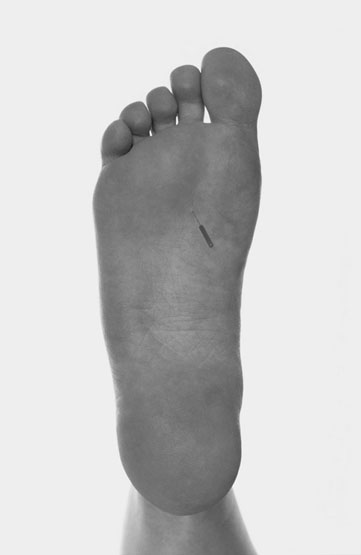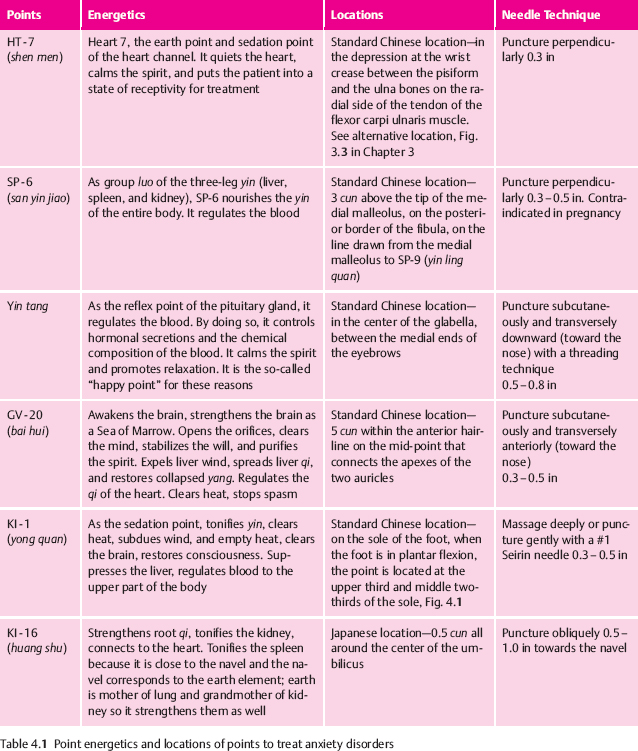4 Gentle Treatment for General Anxiety Disorder, Post-traumatic Stress, and Episodic Anxiety
5 The Relationship between Bunions, Sugar, and the Spleen
6 An Oriental Medical Physician’s Framework for the Understanding and Treatment of Cancer
8 Help for Prolapsed Intervertebral Disks of the Lumbar Region (Herniated Disks)
9 Thyroid Disorders, a Study in Contrasts
10 The Management of Multiple Sclerosis with the Extraordinary Vessels
11 The Pathophysiology and Treatment of Peripheral Neuropathy of the Upper and Lower Extremities
12 Prolapses: A Beneficial Treatment with Oriental Medicine
13 The Treatment of Seasonal Affective Disorder (SAD): Classical Points for a Contemporary Condition
14 A Simplified Approach to the Treatment of Scars
15 Shoulder Problems: A Quick and Comprehensive Approach
16 Repetitive Motion Disorders
| 4 | Gentle Treatment for General Anxiety Disorder, Post-traumatic Stress, and Episodic Anxiety |
As the Ling Shu, the second part of the Huang Di Nei Jing classic text, so wisely stated centuries ago:
To every needling, the method is above all not to miss the rooting in the Spirits. To be effective and at the same time not to violate the organism goes all the way to the origin of the patient’s life, to the place where the Spirits are rooted. The Spirits, vacillating under the emotional shock of apprehension and worry, are no longer guarded in their place and can no longer guarantee the person. There is a dispossession of that which makes the person; one loses possession of oneself.1
These ancient and astute words certainly speak to our times, not just for the 10 million Americans, and countless others worldwide, who on a daily basis suffer from generalized anxiety disorder(GAD—a sustained acute disorder defined as lasting 6 months or longer). Likewise, the millions who experience post-traumatic stress (defined as symptoms persisting for longer than a month after a traumatic or catastrophic event), and episodic anxiety (anxiety linked to an extraordinary life event). Such anxiety and stress can be overwhelming to the person and can manifest as social isolation, uncontrollable worry, tension, irritability, fatigue, muscular aches and pains, sleep disorders, restlessness, extreme anxiety, numbness to the event, palpitations, and startling easily.
While each of these varieties of anxiety differ in terms of their definitions, they have more in common than not. Western treatments tend to center around prescription drug therapy to assist in restoring chemical balance to the brain. Most of these drugs are designed for short-term use; some can become addictive such as the benzodiazepines like Valium and Ativan. Many produce other undesirable side-effects such as decreased appetite, dry mouth, sweating, constipation, tremor, fatigue, and sexual difficulties.
Dr. Allen Keller, a primary care physician at New York’s Bellevue Hospital who heads up a group, Survivors of Torture, recommends the following mechanisms as ways to cope with anxiety and stress. As Oriental medical practitioners, we can apply these principles as well:
- Encourage the patient to maintain social connections in the wake of their problems.
- Don’t force the patient to talk about the traumatic event that is affecting them. (The key word here is force—my italics.) However, allow them to talk about it even if all you can do is listen. You do not have to have a solution, just a compassionate ear.
- Acknowledge the person’s experience of the event and support them in their experience rather than emphasize the medicalization the symptoms.
- However, periodically check in with the person on the somatic symptoms of their distress.
This is not to say that the experience of anxiety is not real or that the somatized symptoms are false, for they are very real physically and can interfere with the person’s functioning and their health. Our aim as practitioners is to bring the patient back to balance. The strength of our medicine is twofold—its energetic paradigm that recognizes patterns of disharmony, as well as the gentle treatment tools we employ.
While a non-specific stress reaction disturbs the flow of energy in the body, a specific stress reaction may involve various zang fu organs. These organs are the yin organs of the liver, spleen, heart, lung, and kidney. The correct differentiation of signs and symptoms reveals which organs are involved. Stress can lead to symptoms of stagnation, particularly of the blood, because stress, as it consumes yin, causes stagnation. Various acupuncture points may be selected for treatment based upon proper discernment of the pattern of disharmony, with the generalized aim of treatment to move the blood, to strengthen the organs, and redistribute and balance the qi.
Certainly as practitioners, we need to balance treating what we see with doing no harm, so there is no set formula for treatment. Treatments should be conservative, for instance using few needles because of the delicacy of the person’s presentation. My preferred point selection includes the ones that follow in Table 4.1 Due to the nature of the problem being addressed, that is, stress and anxiety, and for patient comfort, use #1 30mm Seirin needles. Needles are retained for 10 to 15 minutes.

Stay updated, free articles. Join our Telegram channel

Full access? Get Clinical Tree






